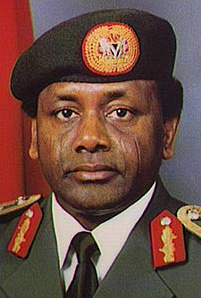General Sani Abacha Military Administrations In Nigeria (17th November, 1993 – 8th June, 1998)

| Abacha | Sanni |
|---|---|
| Full Name | Sanni Abacha |
| Date of Birth | 20th September, 1943 – 8th June, 1998 (Died – {54 Years}) |
| Nationality | Nigeria |
| Place of Birth | Kano, Nigeria |
| Political Party | NIL (Military) |
| Service | Nigerian Army |
| In Office | 17th November, 1993 – 8th June, 1998 (President) August 1985 – November 1993 (Chief of Army Staff) |
General Sani Abacha Military Government In Nigeria

Sani Abacha Military Rule (1993 – 1999)
The Interim National Government was sacked by General Sani Abacha on 17th November, 1993 and, as expected, General Abacha Sanni quickly installed himself as the new Head of State.
The structure of the Abacha government was similar to the Babangida’s in many respects. The Supreme Military Council was redesignated as the Provisional Ruling Council (PRC), perhaps to give the impression of the transient nature of the government. The Head of State was the head of the PRC. The other two bodies were the National Executive Council and the National Council of States.
The Chief of General Staff remained the second-in-command in the government. Lt. General Oladipo Diya, a former military governor of Ogun State under the Muhammadu Buhari government emerged as the Chief of General Staff. He was later arrested along with some other Generals for plotting a coup against Abacha.
The Abacha government adopted a hard line posture in dealing with national issues and its political opponents. It probably had the worst human rights record in the political history of Nigeria. The regime did not waste time in clamping down on groups perceived to be opposed to the government.
For instance, Chief M.K.O. Abiola, who declared himself president after returning from self exile in 1993 was quickly arrested and detained. He eventually died in detention. Leading members of the outlawed National Democratic Coalition (NADECO) which agitated for immediate return to civil rule were arrested and some of them including Chief Alfred Rewane were assassinated.
The lucky ones such as Professors Wole Soyinka and Bolaji Akinyemi had to run into exile to save their lives, Retired Major General Shehu Musa Yar’Adua who participated actively in the 1995 Constitutional Conference was arrested for calling for a quick return to civil rule and he never came out of detention untill later date.
Mr. Ken Sam Wiwa, a leading human rights activist and eight other Ogoni activists were arrested, tried, convicted and hanged despite calls for clemency from within and outside Nigeria. The hanging of Ken Saro Wiwa and others actually took place during the 1995 Commonwealth Conference in Auckland, New Zealand and the body immediately suspended Nigeria from its membership.
Even women were not spared. Mrs. Kudirat Abiola was killed in Lagos just because she called for the release of her husband and the de-annulment of the 1993 presidential elections widely believed to have been won by Chief M. K. O. Abiola. The assassins were suspected to be state agents.
The Abacha government claimed that it foiled two military coups organized against it in 1995 and 1997 respectively. Many critics of the government doubted the authenticity of these claims but the government did not fail to deal decisively with all those who were implicated in the coups.
In the first coup, important personalities like General Olusegun Obasanjo, General Musa Yar’Adua, Dr. Beko Ransome Kuti, Christy Anyanwo and several journalists were sentenced to various terms of imprisonment.
In the second coup, General Oladipo Diya, the Chief of General Staff and several other Generals were sentenced to death. The sudden death of General Sani Abacha on 8th June, 1998 saved them from imminent execution.
The Sanni Abacha government could be credited with the following:
- Prominent members of the opposition such as Ebenezer Babatope, Olu Onagoruwa, Lateef Jakande, and Alex Ibru were appointed as ministers by the Abacha government in 1993 but they were all dropped in the first cabinet reshuffle about one year later. Soon after, Alex Ibru was shot by people suspected to be agents of the government. The first son of Onagoruwa was also killed in mysterious circumstances.
- The government organized the 1995 Constitutional Conference: Although widely boycotted in Western Nigeria, the conference achieved some modest success. The report of the conference was submitted to the government in 1996. Some of its recommendations such as the division of Nigeria into six geo-political zones have proved to be of great political significance long after the collapse of that military junta.
- Five political parties were registered by the government in readiness for elections scheduled for the end of 1998, although the five political parties later adopted Abacha as their joint presidential candidate, a development which appeared abnormal in a competitive party system.
- The government created six additional states on 1st October, 1996 bringing the number of states in Nigeria to Thirty-Six.
- The Abacha government was able to put in place the Vision 2010 programme, which was acknowledged as far sighted. The Olusegun Obasanjo Government did not however find it useful.
- It set up the Petroleum Trust Fund (PTF) under the leadership of General Muhammadu Buhari. Through PTF, Nigerians were able to enjoy some of the benefits of the country’s oil wealth through various interventionist programmes. The major criticism of the Petroleum Trust Fund was that the federal character of the country was not observed in the distribution of projects.